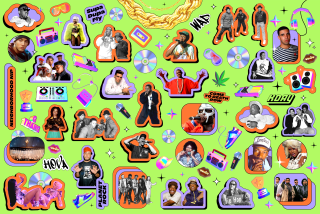SUNNY ADE: A Trailblazer Retrenches
NEW ORLEANS â African pop music and the name King Sunny Ade were virtually synonymous to Western pop fans four years ago.
The Nigerian guitarist and bandleader exploded on the international scene with his first major U.S. tour early in 1983. The colorful visual spectacle of his live performances and the heady, polyrhythmic juju music led many observers to hail Ade as the successor to the late reggae king Bob Marley in bringing Third World music into the pop mainstream.
But when the sales of his three Island Records albums failed to match press notices and concert attendance figures, Ade returned to Nigeria in late 1984 and has maintained a low international profile since.
In the interim, other African artists, like Adeâs fiery countryman Fela Anikulapo Kuti and the South Africans featured on Paul Simonâs âGracelandâ album and tour, have made their marks on the international pop scene.
But Ade, who kicked off a six-week North American tour earlier this month (it includes his first local appearance in three years at the Greek Theatre Friday), professed no regrets over losing his dominant position.
âIt is the answer to my prayer that African music has come to America for the Americans to appreciate,â said Ade, 40, before his appearance at the New Orleans Jazz and Heritage Festival. âI think it is a good thing to me because I believe I am one of the pioneers.â
Like many trailblazers in the segmented music industry today, Ade was hamstrung commercially by a lack of radio air play--outside of specialty shows and some college and alternative stations.
âI think he just got tired of the whole American situation,â said a former staffer for Island Records. âIt was really hard for him or anyone from overseas to understand that without radio exposure you could sell out hall after hall year after year and still only sell a limited number of records. Radio was just not interested and they never have been in African music.â
Over the last three years, Ade has released six albums on his own label in Nigeria--and he says he has material for at least 20 more. Now with new management, he is looking for another shot at cracking the international market.
âI have my label back home, but internationally Iâm a free agent,â Ade said. âI really want to go with a company that can easily understand this kind of music and thatâs ready to let the people know about it. Island Records really tried a lot, I must confess, and they paved the way for people to get aware of this kind of music.â
Ade was born into the Ondo royal family in Nigeria and received an early education in the traditional music of the Yoruba tribe by attending palace events.
âWhen we sat down at the palace with my father, we listened to so much traditional music when theyâre doing this festival,â he said, sitting in the backstage area on the main deck of the riverboat President.
He was dressed like a conservative young businessman. His manner was polite, almost formal--a far cry from the flashy, beaming dynamo whoâd soon hit the Presidentâs stage.
âItâs like a carnival,â he continued, speaking with a light accent. âWhen you go in front of the King, you have five minutes to play some music and then you go. Thatâs how they do it from 8 in the morning to 12 at night.
âWhen his Royal Highness is happy, he gives a donation instead of dancing. Thatâs where the money pasting on the forehead (a Nigerian custom known as spraying) came about, to support and appreciate. For the King to appreciate that, you know heâs a real performer.â
Ade quickly was entranced with the popular juju music, a style derived from traditional Yoruba forms and sung in the tribal language. Against his family wishes, he ran away to the Nigerian capital of Lagos to play music as a teen-ager. He started on congas but soon shifted his focus to guitar and formed the African Beats group in 1966.
Juju music dates back to the 1920s. Tunde Nightengale and I.K. Dairo ushered in the modern era by introducing electric guitars in the â50s. But Ade is widely recognized as the leading innovator in contemporary juju music through his introduction of pedal-steel guitar, synthesizers and the standard drum kit to complement the vocal chants and âtalkingâ drums that are the traditional cornerstones of the sound.
Ade sustained his popularity while introducing those new elements. He has released close to 50 albums in Nigeria--the majority on his own record label--and each one has reportedly sold 200,000 to 250,000 copies, making him the countryâs biggest seller. He tries out new material in a Lagos nightclub he owns, and relies on regular reports from fan clubs throughout the country to keep abreast of popular tastes.
It was Adeâs willingness to experiment and his contemporary flair that helped attract Island Records when the label began delving into African pop in the early â80s. His âJuju Musicâ and âSynchro Systemâ albums received critical raves, and Stevie Wonder made a guest appearance on 1984âs âAuraâ LP.
But Ade was already balking as his manager and producer Martin Meissonnier sought to incorporate more obvious Western pop touches in an attempt to breach the stone wall of radio resistance.
âWhen we came to America the first time we played what we had,â said Ade. âThen my producer said we need to incorporate this or that. I donât want to change my music--I want people to listen to it like that so if Iâm going to develop my music, it should change gradually.
âI tried to please him a little bit by having the Linn drums playing some part and a synthesizer playing in a funk way. But I really disagreed with the production when I finished so I had to readjust, leaving only the Linn drums. When I go home to Nigeria and play that, people said, âWow! Whatâs happening? Are you going Western?â â
But Adeâs courtship of the Western pop audience hasnât eroded his support at home, or the pride he says Nigerians feel in seeing him take Nigerian music to the world stage.
âThey used to call me the music ambassador,â he said. âI go out disciplined and come back disciplined so I think itâs like going out for the Olympics. If you cannot get a gold medal, get a silver or bronze. Even if you donât get a medal at all, if you behave very well, youâve already carried the flag of your nation to that place, and thatâs how they saw it.â
But even that spirit was slightly tarnished by a 1984 incident in Japan, reportedly over unpaid wages, that prompted Ade to fire his entire band when he returned to Lagos.
Ade said that all but four or five of those members--the most notable absentee being steel guitarist Demola Adepoju--have rejoined the 20-piece edition of the African Beats on the current tour.
âThe band didnât break up,â he said. âWe only removed the bad eggs, the unserious ones. Actually, the whole band is 55 back home so when weâre going to tour, we select the best.
âItâs like having two bands in one group, so any time someone is sick or unable to perform well, we have good ones so the sound can keep on. We changed the face but we donât change the sound. We improve on it.â
Adeâs riverboat performance didnât show any marked shift in direction. The only new wrinkle was a synthesizer player who often added horn-like textures and on occasion echoed the tone of the pedal-steel guitar.
Adeâs renewed determination not to veer too far from the classic juju style he developed may bode well for fans of unadorned African music, but it doesnât make the prospects for mainstream commercial acceptance any brighter. But Ade sounded like a man still committed to his original sources of inspiration.
âI didnât learn music from anywhere,â he said. âI taught myself how to play, to dance, to sing, to do everything, even to group the band together.
âThatâs why we say even the trees in Africa sing and play music. Even the sea will give you the drums, or you can get your lines to the voice you hear from the birds singing different things. Anything around you can play music, and thatâs how we see an African man playing.â
More to Read
The biggest entertainment stories
Get our big stories about Hollywood, film, television, music, arts, culture and more right in your inbox as soon as they publish.
You may occasionally receive promotional content from the Los Angeles Times.







